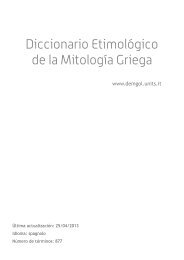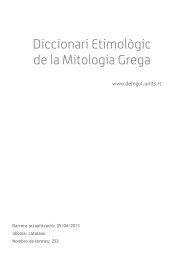Etymological Dictionary of Greek Mythology - Dizionario etimologico ...
Etymological Dictionary of Greek Mythology - Dizionario etimologico ...
Etymological Dictionary of Greek Mythology - Dizionario etimologico ...
You also want an ePaper? Increase the reach of your titles
YUMPU automatically turns print PDFs into web optimized ePapers that Google loves.
<strong>Etymological</strong> <strong>Dictionary</strong> <strong>of</strong> <strong>Greek</strong> <strong>Mythology</strong> - www.demgol.units.it<br />
exiled from Athens to Megara, thereafter marrying the daughter <strong>of</strong> Pylas and fathering numerous children (Apollod.<br />
Bibl. 3, 15, 5-6).<br />
The name is a compound <strong>of</strong> πᾶς, "every" and δῖος, "bright", "illustrious", and thus means "completely bright",<br />
"splendid" (von Kamptz (Homerische Personennamen, p. 93). Höfer (Roscher, Myth. Lex. III col. 1519) thinks it is a<br />
Lycian name.<br />
Category: Names <strong>of</strong> heroes<br />
Пάνδροσος<br />
PANDROSUS<br />
Daughter <strong>of</strong> Cecrops and Aglaurus, sister <strong>of</strong> Agraule (-graulo); she was punished by death for having opened the box in<br />
which Athena had hidden Ericthonius (Apollod. Bibl. 3, 14, 2). Her name, like those <strong>of</strong> her sister and mother (Aristoph.<br />
Thesm. 533 e Schol. ad. l.), was invoked by women, and was also an epithet <strong>of</strong> Athena (Schol. ad Aristoph. Lys. 439).<br />
The name is a compound <strong>of</strong> πᾶς, "every" and δρόσος, "dew" and therefore means "entirely dewy", just as another <strong>of</strong><br />
her sisters was called Ἕρση, that is, "dew".<br />
Category: Names <strong>of</strong> characters<br />
Ῥαδάμανθυς<br />
RHADAMANTHUS<br />
King <strong>of</strong> Crete, son <strong>of</strong> Europa and Zeus, one <strong>of</strong> the three judges in the Underworld. He is mentioned as being in Elysium<br />
already in Hom. Od. 4.564 (cf. also 7.323), with the epithet ξανθός.<br />
The suffix -νθ- suggests the anthroponym belongs to the onomastic substrate (cf. Chantraine, DELG). According to Van<br />
Windekens (Contribution, p. 1), this suffix is characteristic <strong>of</strong> the Pelasgian territories that surround Thrace, Macedonia,<br />
Greece proper and the areas inhabited by the Illyrians. Carnoy (DEMGR) considers it a compound <strong>of</strong> Pelasgian manthu,<br />
"thought" and a word related to Avestan (u)rvata-, "wise", from Indo-European *uer, "to speak", and thus meaning "the<br />
man who expresses wise thoughts". Frisk (Gr. Et. Wört.) suggests instead a connection with ῥάδαμνος, "branch, sprout",<br />
with the ending changed; in this case, the name would mean "he who wields a stick, who carries a sceptre".<br />
Category: Names <strong>of</strong> heroes<br />
Theme: Catabasis<br />
Ῥεία<br />
RHEA<br />
Daughter <strong>of</strong> Gaia and Ouranos, wife <strong>of</strong> Cronos (Hes. Theog. 453ff.).<br />
This name is quite difficult to interpret. A number <strong>of</strong> suggestions have been made by Room (Room's Classical <strong>Dictionary</strong>,<br />
p. 268): the name may derive from the verb ῥέω, "to run"; or, given that it is the name <strong>of</strong> a divinity <strong>of</strong> the earth, it may<br />
be associated with that <strong>of</strong> Hera and derive from ἔρα, "earth", although this hypothesis cannot be verified. According<br />
9







